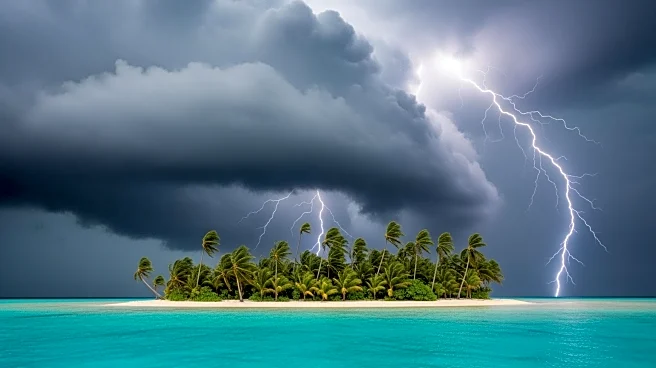What's Happening?
Hurricane Melissa, a Category 5 storm, is advancing towards Jamaica, threatening to become the most severe storm to hit the island in recorded history. The hurricane is currently about 115 miles southwest
of Kingston, with sustained winds of 175 miles per hour. Jamaican officials have issued warnings of 'total structural failure' in high-elevation areas due to the storm's intensity. Melissa is expected to bring up to 40 inches of rain, causing catastrophic flooding and storm surges up to 13 feet. The storm has already resulted in at least seven deaths across the Caribbean, including three in Haiti. Jamaica's Prime Minister Andrew Holness has urged residents in low-lying areas to evacuate, highlighting the risk of 'complete displacement and loss of life.' The storm's impact is exacerbated by Jamaica's mountainous terrain, which could intensify rainfall.
Why It's Important?
The arrival of Hurricane Melissa poses a significant threat to Jamaica's infrastructure and population, with potential economic losses estimated between $5 billion and $16 billion. The storm's impact could be devastating, particularly for the tourism-dependent economy, as it threatens to damage resorts and beaches. The hurricane's approach has already led to the closure of ports and airports, disrupting travel and trade. The broader Caribbean region, including Cuba and the Bahamas, is also at risk, with potential losses in Cuba estimated at $5 billion. The storm's intensity is a stark reminder of the increasing frequency and severity of hurricanes, potentially linked to climate change, which could have long-term implications for disaster preparedness and resilience in the region.
What's Next?
As Hurricane Melissa continues its path, Jamaica and neighboring regions are bracing for its impact. Evacuations are underway in vulnerable areas, and emergency services are on high alert. The storm is expected to move towards Cuba and the Bahamas after impacting Jamaica, with hurricane warnings issued for these areas. The U.S. Navy has evacuated non-essential personnel from its base in Guantanamo Bay, Cuba, in anticipation of the storm. The international community may need to prepare for humanitarian assistance and disaster relief efforts in the aftermath of the hurricane, particularly if infrastructure is severely damaged.
Beyond the Headlines
The potential devastation caused by Hurricane Melissa highlights the urgent need for improved infrastructure and disaster preparedness in the Caribbean. The storm's intensity underscores the challenges posed by climate change, as warmer temperatures contribute to more severe weather events. This situation calls for increased investment in climate resilience and adaptation strategies to protect vulnerable communities. Additionally, the economic impact of such storms can exacerbate existing challenges in the region, including poverty and resource scarcity, necessitating a coordinated response from governments and international organizations.











